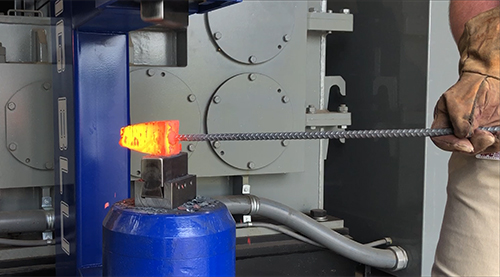News at the HPC²
Forging New Purpose: Updated Edwards Building Supports MSU's Innovative Steel Manufacturing Research
May 15, 2024
A pneumatic power hammer is among the forging capabilities at the Edwards Building, allowing for research on novel wrought alloys. (Submitted photo)
The Edwards Building, located behind the Industrial Education Building at the eastern edge of the parking lot, has been optimized to meet the research needs of MSU's Michael W. Hall School of Mechanical Engineering and the Center for Advanced Vehicular Systems. The updated facility is helping MSU researchers improve steel production methods as the industry works toward the next generation of steel alloys.
Originally built in the 1960s for nuclear engineering research, it later transitioned for the study of steel. The space now is a place to design and prototype novel steels, bridging the gap between research labs producing a few ounces of steel and industrial steel production facilities.
The Edwards Building operates like a small-scale steel mill, giving researchers the ability to create steel plates up to 50 pounds that can be analyzed for different quality measures. New equipment was added as part of the renovation, including a metal formability tester, and an equipment layout redesign will maximize efficiency.
"From melting and casting to rolling and forging downstream processes, these facilities enable MSU researchers to advance steel development in areas relevant to both industrial and government sectors," said CAVS Research Engineer Dawn Van Iderstine. "Precise impurity control through vacuum induction melting provides an ideal environment for alloy design. Subsequent thermomechanical processing can be carried out through controlled hot and cold rolling or by forging schedules, making CAVS research facilities relevant to a variety of industries."
Ross Smith, assistant professor of practice in the Hall School of Mechanical Engineering, said the updated facility and state-of-the-art equipment will serve as a nucleus for interdisciplinary collaboration and empower MSU researchers to push the boundaries of metallurgy and materials engineering.
"This initiative not only enhances MSU's research prowess but also provides students with unparalleled opportunities for hands-on learning and innovation, strengthening the school's academic excellence," Smith said. "Moreover, by fostering collaboration between academia and industry stakeholders, the renovation project serves as a catalyst for regional economic development and industry partnership, positioning MSU as a leader in materials science and engineering."
Haitham El Kadiri, Hall School of Mechanical Engineering Director and PACCAR Endowed Chair, said MSU research is helping to bridge the gap between new materials developed in a lab and industrial production.
"Closing the valley of death for materials microstructure development at the production scale through integrated computational materials engineering (ICME) techniques continues to be a daunting challenge in materials science and engineering research," El Kadiri said. "The manufacturing capabilities at the Edwards Building have been designed to generate and study microstructure evolution mechanisms that operate at intermediate size and times scales suitable to create and validate high-fidelity ICME models."
The upgrades come at a time for growth in the regional steel industry. In 2022, Steel Dynamics Inc. announced plans to invest $2.5 billion into an expansion of its facility in nearby Lowndes County, with the company currently building an aluminum mill. With the success of Steel Dynamics' current operation and plans for growth, CAVS Executive Director Clay Walden said the center is making strategic investments to be a resource for the steel manufacturing community, helping to grow regional economic development.
"While we are doing work in next-generation steel alloys, a lot of our more immediate activity has been around ways to better support production and strategies for the alloys that are already in existence," Walden said. "If you look at all of the different elements in quenching, rolling and heating, it is very expensive to experiment with those different parameters at a mill. These facilities allow us to do smaller-scale experiments here and identify potential production improvements."
Representatives from CAVS and the Hall School of Mechanical Engineering closely examined the hot and cold working processes and identified efficiencies that significantly reduced the amount of employee movement and space needed for the process in the Edwards Building. Several cosmetic improvements were made, including the creation of a conference room.
For more on CAVS' steel research capabilities, visit www.cavs.msstate.edu/research/steel.php.
By James Carskadon
